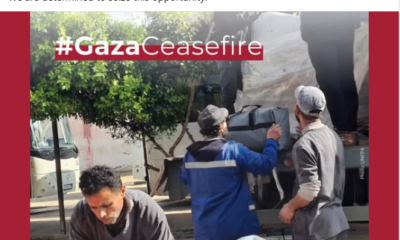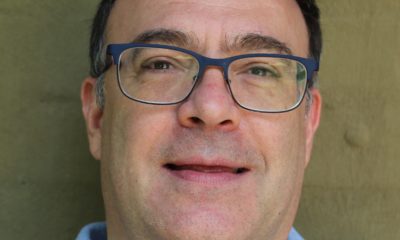
OpEds

Why UNRWA’s words will harm peace prospects
The Israeli government’s decision to ban UNRWA (the United Nations Relief and Works Agency for Palestine Refugees in the Near East) from operating in Israel is not an act of petty revenge for its involvement in the massacres of 7 October. It’s a considered response to decades of toxic indoctrination in its schools and institutions, in East Jerusalem, in Judea and Samaria, and in Gaza, that keeps the Palestinian people in a perpetual state of victimhood and takes us further away from any potential peaceful resolution.
For years, I have sought to amplify the work of experts on the topic of UNRWA’s curriculum of incitement that attempts to turn hatred for Jews and the Jewish state into an education in maths and history.
Since 7 October, it has become clear that past calls to defund UNRWA weren’t alarmist. Indeed, the terror curriculum in the classroom translates directly into terror in the street, with roughly 1 200 UNRWA social workers, teachers, and other employees having already been proven to be Hamas-affiliated terrorists, a portion of whom participated in the rampage of rape, torture, murder, and kidnapping that ignited the current war in Gaza.
Besides instigating the terror that we are living through right now, light is being shed on UNRWA’s role in perpetuating the conflict since the organisation’s inception in 1949, by keeping the Palestinians permanent refugees and instilling destructive philosophies in an entire population. Finally, countries who fund UNRWA are beginning to wake up to the reality of where their money has been going, and are one by one saying, “Enough!”
I spend the majority of my time these days thinking about words: how to phrase mine properly in defence and promotion of Israel in international media; the hateful words spewed by antisemites across the globe; and the great subversion of words that once had meaning, such as “genocide” and “apartheid”. I’m alert, especially now, to the power of words: the impact they can have on others, and the damage they can cause.
Brazil’s President Lula da Silva was recently in the news for hateful words comparing Israelis to Nazis and our war of defence in Gaza to the Holocaust. He was right to identify in this conflict some of the same elements of hate that enabled the systematic annihilation of Europe’s Jews, but he was mistaken in identifying who really has taken up Hitler’s ideas and lust for genocide – Hamas and its proxies – and where it originates.
Hitler’s ideas grew from words on paper to a full-fledged Holocaust in which six million Jews were methodically killed. Similarly, we must acknowledge that the UNRWA curriculum’s indoctrination of children to hate Jews, which begins with simple words on the page of a textbook, has led to violence against Jews that should make anyone with common decency nauseous.
It’s not only in Gaza that words are being used as weapons of incitement against Jews via UNRWA’s curriculum of hate, but here in Jerusalem and Judea and Samaria (the West Bank). The Palestinian Authority and UNRWA provide education for children in East Jerusalem, Judea and Samaria, and Gaza.
Unfortunately, rather than providing an education that focuses on the core subjects needed to succeed in life, the education system is used to indoctrinate its young people at the most impressionable ages. It teaches them that their neighbours stole their land, inciting hatred against the state of Israel, the Israeli people, and the Jewish people. The Palestinian Authority’s mosques, media, and education system poison the impressionable minds of Palestinian children. UNRWA’s mission has evolved into the demand for the right of return of the descendants of Palestinian refugees in perpetuity, a guarantee that the conflict will never be solved.
Last year, even UNRWA Commissioner-General Philippe Lazzarini acknowledged the antisemitism in Palestinian Authority textbooks. “We largely agree with the conclusion – antisemitism, intolerance. Absolutely, these are the issues identified by UNRWA.”
Before the recent pledges to defund or pause funding for UNRWA from several factions, the European Parliament passed a resolution targeting UNRWA for teaching “hate speech and violence” in its schools, harshly criticising the education material that incites and teaches antisemitism. The body has threatened that unless changes are made to the “hate speech, antisemitism, and incitement to violence in Palestinian Authority and UNRWA textbooks”, it will end its funding. Though at the time, the European Union, the body that actually provides the funding, refused to condemn or reduce funding to the agency, it announced in January 2024 through the European Commission that it would be investigating claims against UNRWA before contributing further.
In textbooks published by the UNRWA and the Palestinian Authority, students are indoctrinated to “defend the motherland with blood”; taught that Israelis are “Satan’s aides”; and to solve maths problems using martyrs (i.e. terrorists) who killed innocent Israelis.
The biased education system, coupled with the disinformation and antisemitism shared on social media, creates an atmosphere in which Palestinian children are taught to hate rather than work toward peace and acceptance. Social media is the lifeblood of “Generation Z”.
Social media is a dangerous place where falsehoods spread like wildfire. Between social media and the current Palestinian Authority curriculum, there’s very little chance of convincing Palestinian children why peace and coexistence are the best possible outcomes for our communities.
Words are more powerful than we often think, and when hateful words are used to teach such young people, it leads to violence that has taken so many lives. The books used to teach young Palestinian children are calls to action, destabilising the region and providing a roadblock to peace.
Every child deserves the right to an unbiased education, as education should be used to develop a person’s intellectual capacity rather than as a way to push a violent political agenda and teach that the best they can do with their potential is to martyr themselves for the cause. Many psychologists would call this child abuse.
If we are to usher in a new reality for the region after this war, ending indoctrination of hatred against Israel and Jewish people should be top priority for those countries who want to see a better future for Israelis and Palestinians.
- Fleur Hassan-Nahoum, a Foreign Ministry special envoy, former deputy mayor of Jerusalem and a prominent British Israeli, advocates for unity and cooperation among the city’s diverse communities. Since the onset of the Gaza war, she has condemned Hamas and called for peace, highlighting the importance of maintaining diplomatic relationships in the Middle East.










